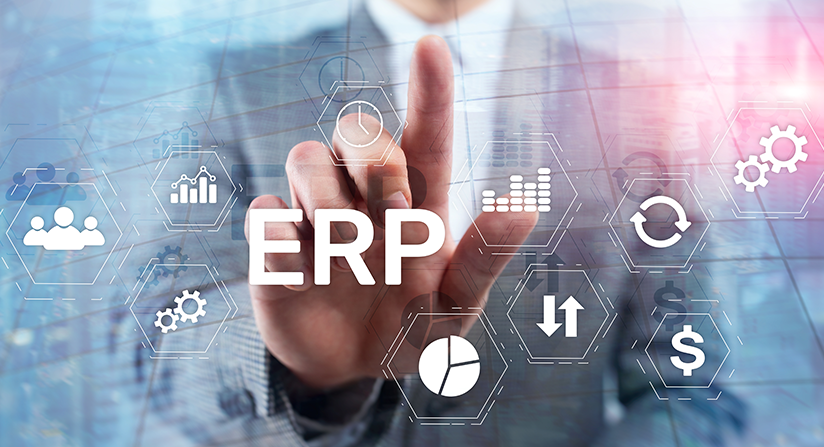Enterprise Resource Planning (ERP) solutions are now a dime a dozen. It’s for this reason that careful attention is needed when selecting the right ERP software for your specific business requirements. That includes your supply chain management needs, such as managing your suppliers and vendors, purchasing or supplying material and parts from/to third parties, and ensuring compliance and quality with your supply chain partners. If your company needs to streamline, automate, and better manage its supply chain, you may have yet to appreciate the role of ERP for Supply Chain Management and understand what solutions out thereare best for your business.
There are several options of software solutions to meet your supply chain management needs. It is a challenge to integrate your supply chain management with your other ERP and core business needs. As such selecting ERP software is even more complicated when one considers features, configuration, and system integration. While there is no silver bullet approach to ERP selection for supply chain management, there are a few best practices and key considerations that can help you make the right choice.
6 Tips for Choosing the Right ERP for Supply Chain Management
Here are a few considerations for choosing ERP solutions for your supply chain management needs:
1. Ensure it’s the right ERP solution for Supply Chain Management in your industry
Regardless of the industry, it is best to avoid generic solutions. There are ERP solutions for Supply Chain Management. It is highly recommended to choose these solutions that fit your industry and business? Is your organization in the perishable goods or fast-moving consumer goods (FMCG) trade? Then, it is advisable to invest in software that accommodates the critical time frames in your supply chain.
In other industries such as pharmaceuticals, supply chains involve raw materials and finished goods for the end-user. All of this has to happen in a way that maintains the quality and safety of the products.
There are other industries where products require unique serialization. ERP solutions that manage the supply chains for these industries are available and quite remarkable.
Since these industries have peculiar supply chain challenges, the ERP solution you choose should comprehensively deal with these unique needs and challenges. Beyond the industry specificity, your ERP solution should of course be able to take care of your company’s uniqueness.
2. Your ERP choice should be compatible with your current systems
Most ERP software for Supply Chain Management tends to have unique strengths and features. It is essential to consider those that integrate well with your current systems (the systems that your new ERP system can’t replace as ERP systems often replace basic accounting systems, CRMs, etc. for growing and digitally transforming companies).
Despite the many benefits of ERP for Supply Chain Management, expect to make significant tweaks, involving configurations, customizations, and data migration, to make your system suitable for your new ERP solution. No system will be perfect, so you might take the path of least resistance by choosing the ERP that will impact your existing systems the least.
3. Interface with relevant stakeholders, teams, and individuals
It matters much how those who will use the new ERP system view it. The more knowledgeable your employees are about your supply chain operations and how an ERP system will affect it, the better.
Their deep knowledge of the industry and the company provides a direct correlation and relationship of how the new system will influence your supply chain operations and how effectively your employees will manage these operations and processes.
Involving your team lends a general sense of ownership that trickles throughout the company. Staff involvement in the process also enhances their willingness to accept the new system and wholeheartedly work to fix any potential shortcomings.
4. The solution should grow as your business and supply chain grow
ERP is the nucleus of your business, so it is important to realize you’re making a choice that can impact your supply chain for a long time. As your business grows, your supply chain management will also evolve to adopt improved practices. The back-end system to handle all that growth should be agile enough to adapt to any new direction your company and supply chain may take.
Your supply chain can rely on cloud ERP. Because there are endless upgrades that are seamless and “automatic”, it is easier for the system to adapt to new changes – whether they be on the software side or related to your changing requirements. Your ERP system’s intrinsic flexibility is important, even if its primary implementation was tailored for your specific industry vertical and business needs.
The question would then be, “Can the system scale?” Besides scaling, can it support multiple approaches to fulfilling your supply chain management functions?
The vendor is also as important as the actual software. A vendor that cannot adequately support their software system leaves behind a system without a soul. The competition in the ERP market with plentiful solutions available inevitably means some vendors will lack the dollars and innovation to adequately support their software products.
5. Pay attention to third-party integrations
“No man is an island” is true with ERP systems as it is with humankind. An ERP system is a coordinating center (like the brain) that has the most value when it plays well with other systems. Therefore, your ERP solution should feature essential connectivity and integrations. It should at least have the interfaces ready to accept integrations.
For Supply Chain Management, you’ll need ERP integrations that relate to your business, including EDI, shipping, and third-party logistics.
One type of integration is point-to-point integration. It connects other software and tools to the ERP software individually, providing customized adapters or applications for supply chain management and related business tools.
The third integration options are Enterprise Services Buses or ESBs. These link applications through a communication bus, serving as centralized tools where applications interface.
Regardless of the ERP software integration option a company chooses to manage its supply chain, it’s advisable to have support (i.e., a vendor that also can play the role of a systems integrator) to assist with integration guidance.
6. Product support
Support from your ERP vendor is non-negotiable. Having the right support from your ERP vendor helps to ensure that your ERP system will properly and adequately be configured to your needs.
With the right support, your company can take advantage of its internal supply chain resources, evolve its processes and systems, and maximize your ERP software solution.
Your chosen vendor should have a long-term outlook, willingness to partner with you on the most critical supply chain challenges, and, importantly, have industry experience. It’s the only way to reap the most from your ERP investment and supply chain resources.
FAQs
What is the role of ERP in Supply Chain Management?
ERP software enables improved supply chain management by streamlining and coordinating associated processes (vendor management, orders, purchases, and deliveries from supply chain partners, etc.) and integrating these processes with other critical business functions (accounting, purchasing, manufacturing, etc.). It also helps with demand planning, forecasting, procurement, production planning and scheduling, and shipping.
What can an ERP do to help Supply Chain Management?
Using ERP, companies can manage customer requirements more effectively. It can also help with billing, sales and service, and financial accounting, which are integrated inan ERP system.
Also, some systems feature analytics tools that fulfill transportation KPIs such as average cost per shipment and percentage of on-time deliveries.
ERP systems can provide custom reports that use data from external systems. It can help with faster decision-making, risk management, automation, and accessibility. With better control over business operations, it is easier to improve business performance and gain a competitive advantage in your industry.
What to look for in an ERP to better manage your supply chain?
First, does the ERP effectively support and fit your supply chain management functions and processes? Will it disrupt your current activities, and by how much? You generally want a system that works well with suppliers, shippers, and other vendor systems – one that maintains harmony in the supply chain.
Conclusion
Most businesses, regardless of their industry, now see the benefit of acquiring an ERP system. The benefits are immense for supply chain management, so it is imperative to not forget this when evaluating ERP systems. Selecting an ERP system for your supply chain management needs in addition to your other business needs will allow total control of not only what happens inside your business, but also across your supply chain. To learn more about supply chain management and ERP selection, please contact us here.
Follow Us









